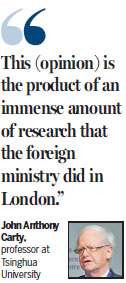Professor cites historic records backing sovereignty
By Anthony Warren in Hong Kong (China Daily) Updated: 2016-07-18 09:45In the aftermath of the arbitral ruling presented by The Hague's Arbitral Tribunal of the Permanent Court of Arbitration on July 12, John Anthony Carty, a professor at Tsinghua University, is among a number of international academics and maritime experts who are now questioning the decision's denial of Chinese rights in the South China Sea.
Carty said that he has studied centuries worth of records produced by European nations and the United States. These official accounts - excepting a period in the 1930s when France unilaterally seized individual South China Sea islands under Chinese protest - recognize China's historic sovereignty over the islands.
The British scholar spoke on the topic of historic rights at a two-day international forum on maritime dispute settlement held in Hong Kong on Friday and Saturday.

Historic titles and rights are recognized in the United Nations Convention of the Law of the Sea, or UNCLOS, and China declared in 2006 that under Article 298 it would not be party to arbitration regarding historic bays and titles.
"I have found my research in the archives quite astonishing," said Carty, referring to his findings. Among the records he said he has uncovered is a legal opinion by the British Foreign Office from the 1970s. The report, which is now digitally available, was presented to the British cabinet and then prime minister, James Callaghan.
Carty said the British record proves there is no dispute regarding the Nansha Islands and that China is the sole titleholder.
"This British record is not just the opinion of an individual lawyer - this is the product of an immense amount of research that the foreign ministry did in London. They investigated all of their archives and all of the correspondence they had with other countries for a period of 100 years," he said.
He said, however, that any claims that China must produce historic administrative papers and state acts to explain a "connection with (their) own homeland" is something that "makes no sense". He further asked how "natives" - as Chinese were referred to in the British and French texts - were expected to "notify themselves" about holding their own lands for centuries.







